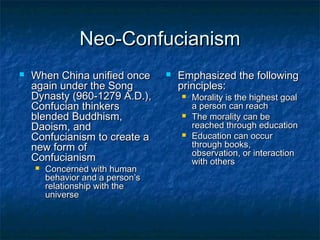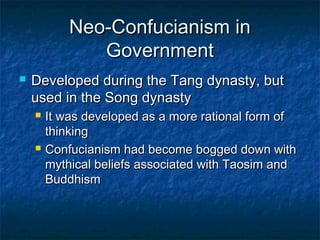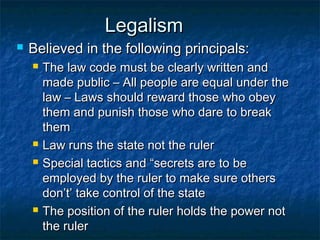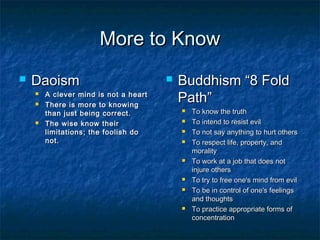Chinese philosophy2
- 1. Do Now Answer the following question on a scrap piece of paper: What would you do: You know that you are failing a class. You know you will be in trouble when your parents find out. How would you handle this situation?
- 2. Enduring Understanding ŌĆó Analyze how philosophy, religion, and technology molded Chinese society and government ŌĆó Describe how Buddhism, Confucianism, Taoism (Daoism), and Legalism influenced Chinese society
- 3. Philosophy ’ü« doctrine: a belief (or system of beliefs) accepted as authoritative by some group or school ’ü« The rational investigation of questions about existence and knowledge and ethics ’ü« Any personal belief about how to live or how to deal with a situation; "self-indulgence was his only philosophy"; "my father's philosophy of child-rearing was to let mother do it"
- 4. Three Doctrine and Legalism ’ü« Philosophies which influenced the development and execution of government in China. Each dynasty used a different philosophy to guide decision making
- 5. Philosophy in Ancient Chinese Government ’ü« When a dynasty came to power itŌĆÖs first priority was to establish a strong central government ’ü« When the government was established they relied on the guidance of a philosophy or way of looking at the world or thinking about knowledge, to guide them in making laws and regulations
- 6. Chinese GovernmentsŌĆ” ’ü« Relied on several philosophies: ’ü« Confucianism ŌĆō Most influential ŌĆō based on the teachings of Confucius ’ü« Buddhism ŌĆō A religion NOT a philosophy ŌĆō based on the teachings of Buddha ’ü« Taoism ŌĆō based on the teachings of Lao Tzu ’ü« Legalism ŌĆō based on the teachings of Shang Yang ’ü« Neo ŌĆō Confucianism ŌĆō Developed by Han Yu and Li Ao
- 7. Confucius Says: ŌĆ£He who learns but does not think is lost; he who thinks but does not learn is in dangerŌĆØ
- 8. Confucianism vs. Buddhism: Why Buddhism? ’ü« Confucianism is a belief system based on the ideas of Confucius- A scholar who taught moral virtues and ethics
- 9. Confucianism ’ü« A belief system that was practiced by Chinese dynasties and their subjects ’ü« Confucius believed that there was a basic order in the Universe that should be reflected in human relationships. The family unit being the central relationship ’ü« Confucianism emphasized the importance of education
- 10. 1. Ruler Subject 2. Father Son 3. Husband Wife 4. Older Younger Brother Brother 5. Older Younger Friend Friend
- 11. Confucianism ’ü« Confucianism ’ü« 5 Confucian emphasized the following Relationships: principles: ’ü« Ruler to Subject ’ü« Use the right relationships ’ü« Husband to Wife to produce social order ’ü« Parent to Child ’ü« Respect for family and ’ü« Elder brother to younger older generations brother ’ü« Educate individuals and ’ü« Friend to friend society Each role had clearly defined ’ü« Act in morally correct ways duties
- 12. Confucianism in Government ’ü« Since the family unit is seen as the primary social unit ChinaŌĆÖs government would be a monarchy with itŌĆÖs structure based on the structure of the family ’ü« The ruler was seen to be the son of heaven and the father of the people ’ü« The role of the government was as protector of the peopleŌĆÖs welfare
- 13. Confucianism in Government ’ü« Confucian political theory emphasized conflict resolution through mediation rather than the application of complex rules ’ü« Civil service in which all officials were to be selected for their moral qualities that would allow them to govern by example and their status was measured by their scores on the civil-service examination
- 14. How did Confucianism influence Chinese life? ’ü« Confucius taught that people could advance themselves through education. An emphasis on education helped produce an efficient, well- trained set of government officials known as Scholar-Leaders
- 15. Buddhism ’ü« Buddhism- A religion that started in India in the 6th century by Siddhartha Gautama also known as ŌĆ£The BuddhaŌĆØ or ŌĆ£Enlightened OneŌĆØ
- 16. Buddhism ’ü« Emphasized the ŌĆ£Four Basic TruthsŌĆØ ’ü« Suffering is part of life ’ü« The reason people suffer is that they are too attached to material possessions and selfish ideas ’ü« Suffering has an end ’ü« By living in a wise, moral, and thoughtful way, people can eventually learn to escape suffering
- 17. Buddhism in Government ’ü« Buddhism became popular in government during the Tang Dynasty - Tang emperors relied on Buddhist monks as counselors regarding war, law, etc. ’ü« In 845 ŌĆō The Tang Emperor Wu Tsang destroyed Buddhist temples and monasteries to replace belief in Buddhism with Confucianism and Taoism
- 18. Not sure when he died. [604 B.C.E. - ?] His name means ŌĆ£Old MasterŌĆØ Was he ConfuciusŌĆÖ teacher?
- 19. The basic text of Daoism. In Chinese, it means The Classic in the Way and Its Power. ŌĆ£Those who speak know nothing: Those who know are silent.ŌĆØ These words, I am told, Were spoken by Laozi. If we are to believe that Laozi, Was himself one who knew, How is it that he wrote a book, Of five thousand words?
- 20. 1. Dao [Tao] is the first-cause of the universe. It is a force that flows through all life. 2. A believerŌĆÖs goal is to become one with Dao; one with nature. [ŌĆ£The butterfly or the man?ŌĆØ story.] 3. Wu wei --> ŌĆ£Let nature take its course.ŌĆØ --> ŌĆ£The art of doing nothing.ŌĆØ --> ŌĆ£Go with the flow!ŌĆØ 4. Man is unhappy because he lives acc. to man-made laws, customs, & traditions that are contrary to the ways of nature.
- 21. To escape the ŌĆ£social, political, & cultural trapsŌĆØ of life, one must escape by: 1. Rejecting formal knowledge and learning. 2. Relying on the senses and instincts. 3. Discovering the nature and ŌĆ£rhythmŌĆØ of the universe. 4. Ignoring political and social laws.
- 22. Feminine Masculine Passive Active Darkness Light Cold Warmth Weak Strong Earth; Heaven; Moon Sun
- 23. Daoism or Taoism: ŌĆ£The WayŌĆØ or ŌĆ£The PathŌĆØ ’ü« A belief system that seeks harmony with nature and inner feelings ’ü« ŌĆ£The only human actions that make sense are those which are in accord with the flow of nature ’ü« Denounced violence as reflecting the ultimate ignorance of the way of nature ’ü« Opposed Confucianism
- 24. Taoism ’ü« Taoism rejects any human ideas or standards which might lead to: ’ü« An overly assertive mode of behavior ’ü« Too strong a commitment to the achievement of worldly goals ’ü« Denounce violence as reflecting the ultimate ignorance of the way of nature ’ü« No one should have excessive desires ’ü« Wu-wei- ŌĆ£non-actionŌĆØ- does not mean doing absolutely nothing, but don nothing unnatural
- 25. Taoism in Government ’ü« During the Tang dynasty the emperors practiced Taoist beliefs and practiced ’ü« Focused on traditional beliefs and myths
- 26. How is a man to live in a world dominated by chaos, suffering, and absurdity?? Confucianism --> Moral order in society. Legalism --> Rule by harsh law & order. Daoism --> Freedom for individuals and less govt. to avoid uniformity and conformity.
- 27. 280? - 233 B.C.E. Han Fe Zi. Lived during the late Warring States period. Legalism became the political philosophy of the Qin [ChŌĆÖin] Dynasty.
- 28. Neo-Confucianism ’ü« When China unified once ’ü« Emphasized the following again under the Song principles: Dynasty (960-1279 A.D.), ’ü« Morality is the highest goal Confucian thinkers a person can reach blended Buddhism, ’ü« The morality can be Daoism, and reached through education Confucianism to create a ’ü« Education can occur new form of through books, observation, or interaction Confucianism with others ’ü« Concerned with human behavior and a personŌĆÖs relationship with the universe
- 29. Neo-Confucianism in Government ’ü« Developed during the Tang dynasty, but used in the Song dynasty ’ü« It was developed as a more rational form of thinking ’ü« Confucianism had become bogged down with mythical beliefs associated with Taosim and Buddhism
- 30. Legalism ’ü« Believed in the following principals: ’ü« The law code must be clearly written and made public ŌĆō All people are equal under the law ŌĆō Laws should reward those who obey them and punish those who dare to break them ’ü« Law runs the state not the ruler ’ü« Special tactics and ŌĆ£secrets are to be employed by the ruler to make sure others donŌĆÖtŌĆÖ take control of the state ’ü« The position of the ruler holds the power not the ruler
- 31. More to Know ’ü« Daoism ’ü« Buddhism ŌĆ£8 Fold ’ü« ’ü« A clever mind is not a heart There is more to knowing PathŌĆØ than just being correct. ’ü« To know the truth ’ü« The wise know their ’ü« To intend to resist evil limitations; the foolish do ’ü« To not say anything to hurt others not. ’ü« To respect life, property, and morality ’ü« To work at a job that does not injure others ’ü« To try to free one's mind from evil ’ü« To be in control of one's feelings and thoughts ’ü« To practice appropriate forms of concentration
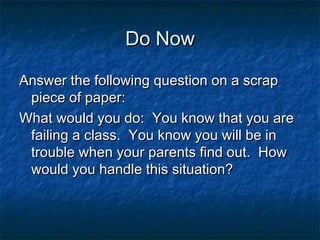
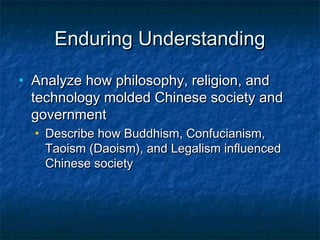
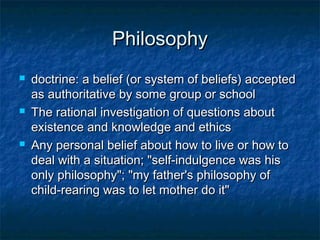
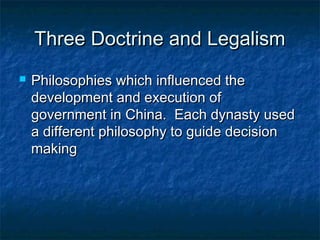
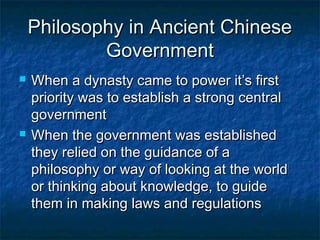
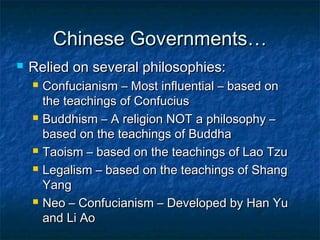
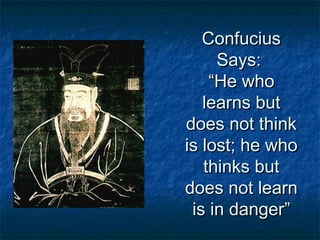
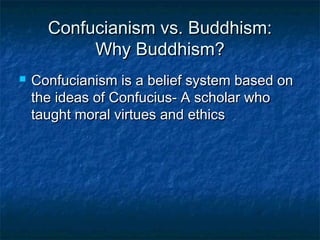
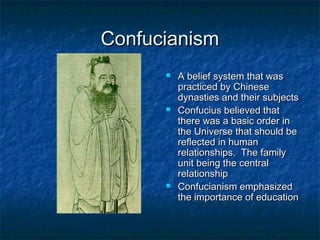
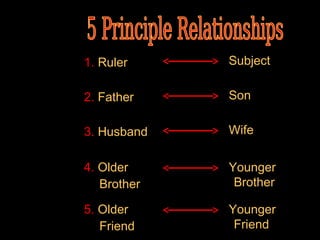
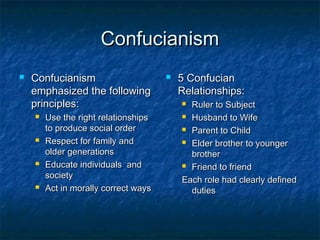
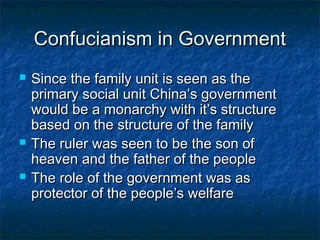
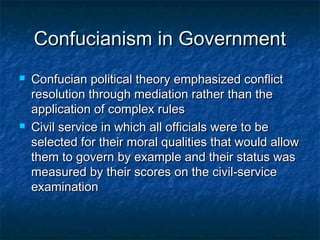
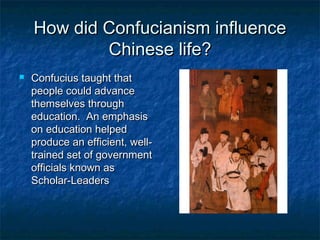
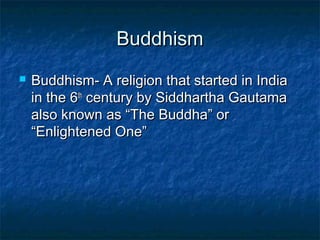
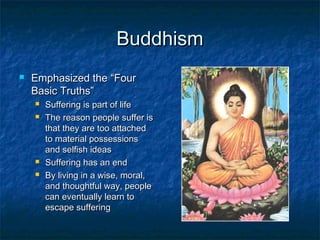
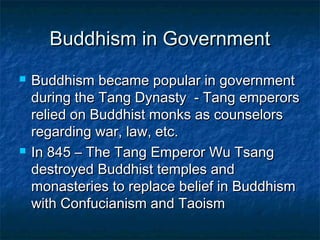
![Not sure when he
died.
[604 B.C.E. - ?]
His name means
ŌĆ£Old MasterŌĆØ
Was he ConfuciusŌĆÖ
teacher?](https://image.slidesharecdn.com/chinesephilosophy2-130127171541-phpapp02/85/Chinese-philosophy2-18-320.jpg)
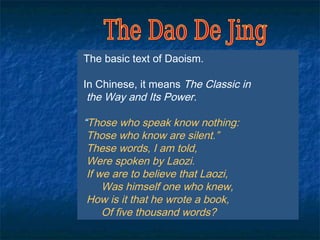
![1. Dao [Tao] is the first-cause of the
universe. It is a force that flows through
all life.
2. A believerŌĆÖs goal is to become one with
Dao; one with nature. [ŌĆ£The butterfly or
the man?ŌĆØ story.]
3. Wu wei --> ŌĆ£Let nature take its course.ŌĆØ
--> ŌĆ£The art of doing nothing.ŌĆØ
--> ŌĆ£Go with the flow!ŌĆØ
4. Man is unhappy because he lives acc. to
man-made laws, customs, & traditions that
are contrary to the ways of nature.](https://image.slidesharecdn.com/chinesephilosophy2-130127171541-phpapp02/85/Chinese-philosophy2-20-320.jpg)
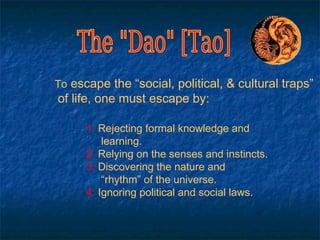
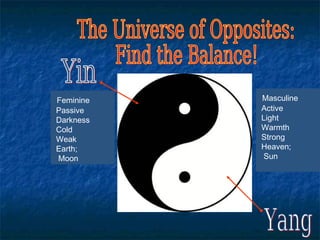
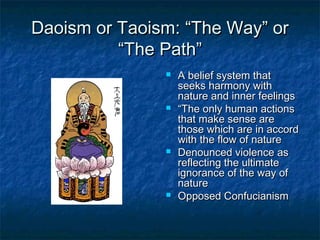
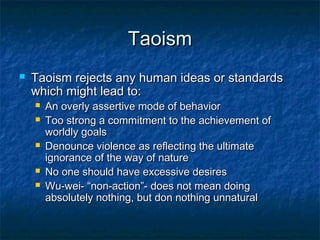
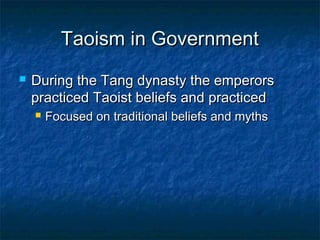
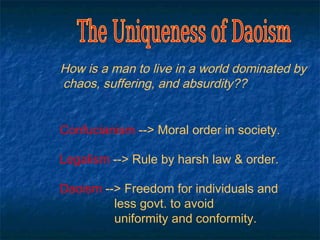
![280? - 233 B.C.E.
Han Fe Zi.
Lived during the
late Warring States
period.
Legalism became
the political
philosophy of the
Qin [ChŌĆÖin] Dynasty.](https://image.slidesharecdn.com/chinesephilosophy2-130127171541-phpapp02/85/Chinese-philosophy2-27-320.jpg)
